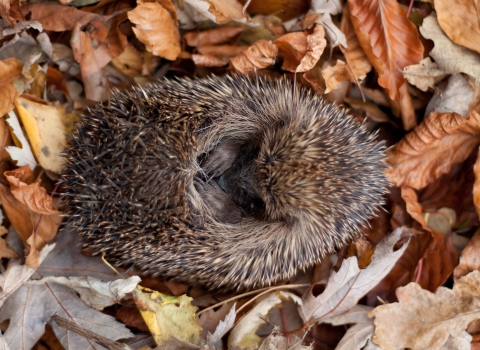Wildlife information and advice
Wanting to make a home for nature in your garden? Seen an interesting species in your local area and want to report it? Have you found an injured or stranded animal? Take a look at our FAQs below and we'll see if we can help!
Wildlife FAQs
Q: What should I do if I find a sick or injured bird?
A: Unless the bird is in immediate danger, you're best to leave it where it is. In spring and summer, birds are beginning to leave the nest and fledglings can often be seen on the ground, seemingly alone. This is not often the case, and the parents will usually be close by searching for food and keeping a close eye on their chick. If the bird is in a busy road or footpath, or is in danger of being attacked by predators, the bird can be moved a minimal distance, but must still be in hearing range of the parents who will be nearby. For more information, go to our national Wildlife Trust website.
Q: What should I do if I find a sick or injured animal?
A: The Trust is not a welfare charity and therefore cannot provide care or rehabilitation facilities for sick or injured wildlife. Please contact the RSPCA or visit the HelpWildlife website. Alternatively, you can contact one of our local specialists below, but please bare in mind they cannot usually provide transport.
The Owls Trust
theowlstrust.org/
Phone: 01492 870719
Mobile: 07776 416922
Red Squirrels Trust Wales
www.redsquirrels.info/
Phone: 07966150847
RSPB
www.rspb.org.uk/
Phone: 01767 693690
Clwyd Badger Group
www.clwydbadgergroup.org.uk/
Phone: 01244 544823
Q: How can I help wildlife in my garden?
A: There are numerous ways in which you can help wildlife in your own garden, from creating bug hotels and bird nest boxes to providing hibernation spots for frogs and toads. Visit our wildlife gardening section for ideas and inspiration.
Q: How do I report a wildlife sighting in my area?
A: Please do tell us about the wildlife you've spotted in North Wales and on our reserves! Your information will increase our knowledge of North Wales's wildlife and its distribution, and help us to make better decisions about conservation management.
Your wildlife records can be submitted to Cofnod, North Wales' Environmental Information Service
They need to know:
- What – the species (and number if more than one)
- When – the date seen
- Where – the location of the sighting (a grid reference or postcode is best)
- Who – contact details in case any further details are needed
Q: How can I report a wildlife crime?
A: Reporting wildlife crime ensures incidents are formally logged on the police computer, enabling easier research of wildlife crime at a later date if required. There is no reason to approach individuals who are committing offences. To report a wildlife crime:
- Ring the police on 101
- State you are reporting a crime
- Give relevant details
- Obtain an incident number
- Ask to be updated with the results
For further information about Wildlife Crime in North Wales and contact details for Wildlife Crime Officers, see the North Wales Police website.
Q: How do I report a marine stranding?
A: If you find DEAD stranded large animals (whale, dolphin, porpoise, basking shark, turtle) then please contact the UK Cetacean Strandings Investigation Programme on 0800 652 0333. This will help to provide an accurate picture of marine life in the UK, as well as valuable information on causes of death.
For any LIVE stranded animals please call British Divers Marine Life Rescue (www.bdmlr.org.uk) on 08125 765546 or 07787 433412 (out of hours); or the RSPCA on 0300 123 4999.
Q: How can I get a ecological survey to obtain planning permission?
A: In order to obtain an ecological survey to obtain planning permission please contact Enfys Ecology with details of your planned development, photographs and any feedback you may have already received from the County Council's ecologist. The survey you require will depend on the work you intending on carrying out. If it affects undeveloped land it is likely to need a preliminary ecological appraisal (PEA) or Phase 1 habitat survey / ecological assessment. If the work is extending a property or conversion then a protected species survey looking at bats and birds is likely to be required.
Become a member to continue our work
Your membership will support the Trust's vital conservation and education projects across the region, including habitat restoration, species protection and maintaining our nature reserves.

